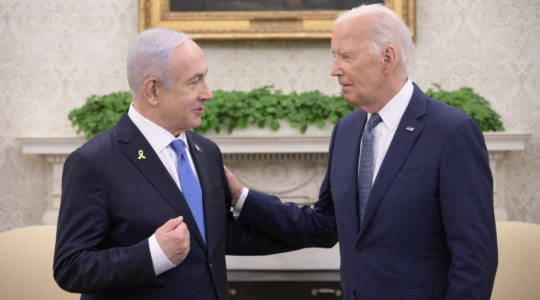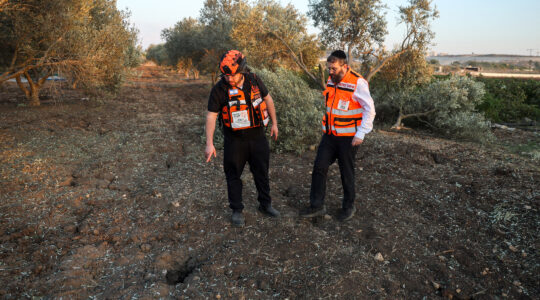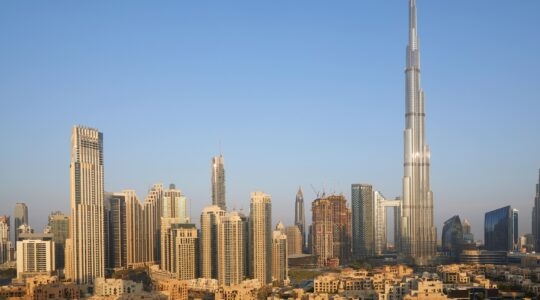JERUSALEM (JTA) – In stark contrast to the past, when Israel and its American allies in Washington vehemently opposed arms sales to Saudi Arabia, Jerusalem appears to be on board with a new Bush administration plan to sells billions of dollars of weapons to the Saudis.
The reason for the change of heart? Iran.
With the threat of Iran looming ever larger, both the United States and Israel are taking steps to increase the military might capable of countering Iran and its radical forces in the region.
The United States intends to increase military aid to its allies in the Middle East to the tune of around $60 billion over the coming decade. Most of the American weapons would go to Saudi Arabia, Egypt and Israel.
At the same time, Israel plans to dramatically increase its own defense budget by more than $11 billion during the same period. The changes Israel intends to make in the Israel Defense Forces with the bigger budgets are said to be the most far-reaching in years. Defense Minister Ehud Barak has redefined the threats Israel is facing and wants to restructure the armed forces accordingly.
On Sunday, the government approved a hike of 46 billion shekels – or $10.6 billion – in defense spending over the next 10 years, but it postponed a vote on an additional 7 billion shekels – or $1.6 billion – that Barak wants for 2008.
Under President Bush’s plan, American military aid to Israel over the next decade would increase from $26 billion to $30 billion. Israel wants to use part of this to purchase state-of-the-art American warplanes, F-35 fighters and the F-22 stealth bomber, which to date the United States has not sold to any other country.
In the same period, Egypt would receive $13 billion in military aid under the Bush administration plan. That aid would keep Egypt at its current levels despite some moves in Washington to reduce it.
The most dramatic departure for the Americans, though, would be a $20 billion arms sale to the Gulf countries, mostly to Saudi Arabia.
Some U.S. legislators oppose the sale because, they say, the Saudis are allowing Sunni militants in the kingdom to attack U.S. forces in Iraq and are afraid to intervene, fearing the militants might turn on them. U.S. officials say the administration will insist that the Saudis clamp down on this kind of terror and show a higher profile in peace overtures toward Israel, including a committment to attend the regional peace conference the United States is planning for September.
Despite intense Israeli opposition to arms sales to Saudi Arabia in the past, most notably in the mid-1980s, Prime Minister Ehud Olmert fully accepts the argument that the arms are part of a major U.S. effort to counter Iran’s hegemonic regional ambitions.
Iran is a primary backer of Hamas and Hezbollah, terrorist groups that sit on Israel’s southern and northern borders. Iran has also made moves in recent months to keep Syria in its orbit and prevent Saudi Arabia from playing an active role in the latest American-sponsored Middle East peacemaking initiative.
The Saudi arms deal was one of the key issues Olmert discussed with Bush during a June visit to Washington. Bush assured the Israeli leader that the Saudis would not be given any weapons Israel doesn’t have, and that they would not be allowed to deploy systems close enough to the border to put Israeli targets in range.
The clincher for Olmert, though, according to diplomatic sources, was the corresponding increase offered by the president in military aid to Israel. This and the promise of super-sophisticated weaponry will help the United States keep its commitment to maintain Israel’s technological edge over any of its potential enemies.
Still, the Israeli right has offered some muted criticism of the U.S.-Saudi deal. Former Gen. Yossi Peled, the Likud Party candidate for defense minister, warned that in the event of a radical takeover in Saudi Arabia, the arms – which include precision munitions – could be turned on Israel.
Israeli government spokesmen counter that even if that were to happen, Israel would have the wherewithal to deal with whatever military problems it posed.
Due to the multiple threats Israel is facing in the region, Barak wants a significant increase in the size of the land army. He says he wants to create two more ground divisions, which would enable an overwhelming IDF response on any front, presumably even against the Saudis, if things were to go wrong in the kingdom.
In analyzing the shortcomings revealed in last summer’s Lebanon war and the evolving “threat map,” which includes heightened missile threats from Iran, Syria, Hezbollah and Hamas and the possibility of full-scale war on more than one front, Barak has come up with five major priorities:
* The development of “multilayered” anti-missile defenses. This means putting in place a combination of anti-missile systems to deal with missiles of all sizes and ranges, and within five to seven years making Israeli air space virtually impregnable.
* To restore Israel’s famed capacity for ground maneuver on enemy territory through intensive training and the creation of the two new divisions.
* So-called “logistic breathing space,” which means making sure emergency stores are at capacity.
* Training and providing budgets for large-scale exercises involving brigades and divisions.
* Building up Israel’s capacity to strike targets thousands of miles away.
Barak told the Cabinet on Sunday that providing funds for all these ambitious projects was the only way to guarantee “decisive victory” in any future war. His budgetary demands coincided with an intensive review of Israeli military spending conducted by a committee under the former Treasury director-general, David Brodet. The committee made dozens of recommendations for economizing in the defense establishment, but also proposed significant increases in overall defense spending.
The thinking is that savings on the non-essentials together with the increases will provide huge sums for investment in strengthening the IDF.
The IDF has already carried out some of Barak’s reforms. The emergency supplies, found wanting during the Lebanon war, have largely been replenished. Huge land exercises have been carried out at divisional levels and major reforms in the training of troops have been introduced.
But Israel needs to be ready for more than a repeat of last summer’s war. At the very least, it has to take into account the possibility of simultaneous hostilities from Gaza, Lebanon, Syria and Iran.
With this in mind, will there be funds for the rest of the ambitious reforms Barak has in mind? And if they are carried out, where will they leave the IDF vis-a-vis the new “threat map” – especially the multiple threats emanating from Tehran?

Help ensure Jewish news remains accessible to all. Your donation to the Jewish Telegraphic Agency powers the trusted journalism that has connected Jewish communities worldwide for more than 100 years. With your help, JTA can continue to deliver vital news and insights. Donate today.





